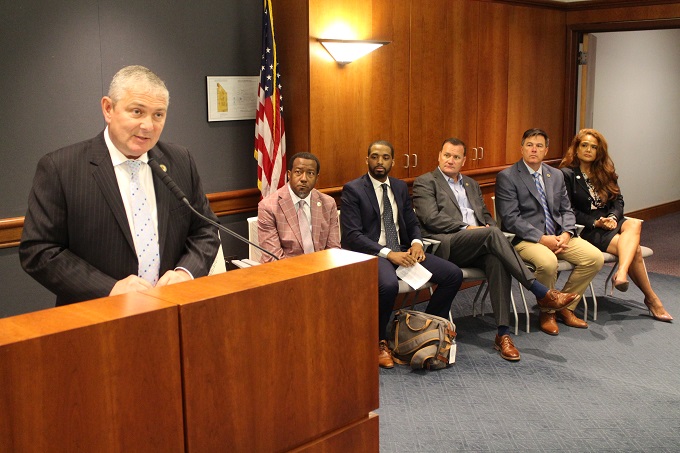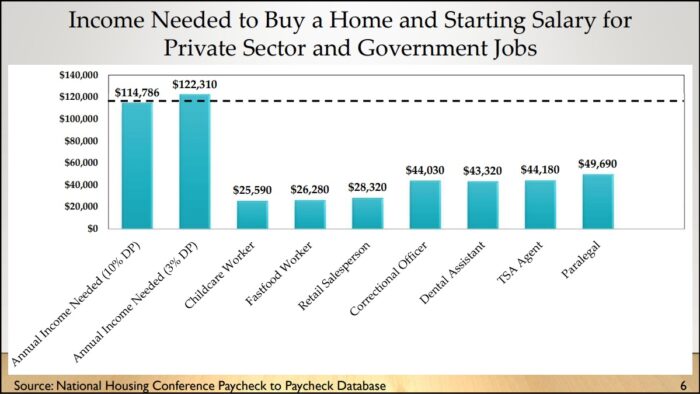
Henrico County Manager John Vithoulkas at Thursday’s press conference alongside, from left: Board Chairman Tyrone Nelson, Jovan Burton of Partnership for Housing Affordability, and supervisors Dan Schmitt, Jody Rogish and Misty Whitehead. (Jonathan Spiers photos)
Less than a month after receiving a directive from county supervisors for “something transformational” to address housing affordability, Henrico officials have come up with a plan that leans heavily on a growing source of revenue: data center dollars.
Henrico is contributing $60 million in cash to establish its first housing trust fund, which will be fueled by economic development revenue generated specifically from data centers.
Officials announced the plan in a news conference Thursday, three weeks after supervisors directed staff to do something more than the county already has to address the growing housing affordability gap across the region.
The announcement also came days after the board approved zoning for a 622-acre development site in Varina that’s planned to include multiple data centers. Deliberations about that project informed the plan to dedicate tax revenue from new economic development and data centers specifically, County Manager John Vithoulkas said.
Henrico currently is home to 16 data centers that generate over $13 million in annual tax revenue. Revenue for the trust fund would come from real estate taxes from data centers, which the county has incentivized in recent years with reductions to its data center tax rate.
At the same time, state legislators have voiced concerns about the uptick in data center development across Virginia and directed the Joint Legislative Audit and Review Commission to study the issue. A report from JLARC is expected later this year.
Board Chairman Tyrone Nelson, who represents the Varina District, called data centers one of Henrico’s “major growth industries” in announcing the plan, which he and other speakers described as the first of its kind for addressing housing affordability and homeownership.
“We’re doing something different,” Nelson said. “We may be the only locality in the commonwealth, maybe in the country, dedicating a single revenue source to address a crisis like this in our community.
“This trust will expand and sustain our efforts to provide opportunities for affordable homeownership for working individuals and families. We’re talking about the workers who are essential to making Henrico be such a great and vibrant community to be a part of.”
As of March, the median sale price for a single-family detached home in Henrico was $390,000, while the annual income needed to buy a home in the county remained at least double the starting salaries for many county employees.
According to Virginia Realtors data, the median home price statewide rose from $287,000 in 2020 to over $384,000 in 2024, while mortgage rates in that time effectively doubled, from about 3.5% in 2020 to 6.8% this year. Monthly payments followed suit, and the income needed to afford a home in Virginia increased by 76%, from $67,400 four years ago to $118,300 today.
Higher demand over supply has also increased rents, making it harder for renters to save toward a down payment and build wealth through homeownership. While the plan announced Thursday focuses on homeownership specifically, Nelson said efforts to address rents and affordability in multifamily housing will be coming.
“We’ll enter into that at some point. Today, we start with homeownership,” Nelson said.

Working with Partnership for Housing Affordability, a regional nonprofit, the county will use the trust to provide grants to nonprofits such as the Maggie Walker Community Land Trust (MWCLT) and for-profit developers to offset the costs of residential lots dedicated for income-based housing.
Such an approach was taken with the county’s approval last year of East West Communities’ Arcadia project in Varina, with agreements that at least 20 of the homes in the nearly 800-home project would be built for lower-income households. With those lots being put in the regional land trust, the cost of homeownership is reduced while the land is kept “permanently affordable.”
Henrico’s plan would further keep costs down by waiving water and sewer connection fees and building permit fees, and providing expedited review for any project that includes lots for homes for lower-income residents. By doing so, Nelson said, the county expects that the cost of buying a home in Henrico would be reduced by as much as 30%.
The board intends to make its first appropriation for the trust fund at the start of the fiscal year that begins July 1.
Henrico’s $60 million investment, which doesn’t involve debt or funds from the county’s annual budget, compares to the $75 million that makes up the Virginia Housing Trust Fund for the whole state, said Jovan Burton, executive director of the Partnership for Housing Affordability. Where 80% of the state fund is made up of loans and 20% is grants, Burton noted, Henrico’s is 100% cash.

Jovan Burton of the Partnership for Housing Affordability, which will manage the trust fund with the county.
Of about 750 housing funds in the country, Burton said, “This one is the only one that we could find that is using data center revenue as the sole dedicated source. This is unique not just here in the state but the entire United States.
“Having a stable, healthy and affordable place to call home is a priority. It’s a foundation for so many things,” Burton said, listing as examples student achievement and generational wealth accumulation. “Thanks to Henrico County and their vision and their leadership, we will be able to create many opportunities for families who haven’t had that and unlock the power of homeownership.”
Laura Lafayette, CEO of the Richmond Association of Realtors and immediate past chair of MWCLT, called Henrico’s plan “unprecedented” after the announcement.
“The fact that it’s grant money and not loan money is a game-changer,” she said. “We know that if we’re going to do anything that is to scale in terms of addressing the affordable housing challenge, we need to be in partnership with private developers, and this lays out the incentives and the cash resources for the private developers to join forces with nonprofits and scale the response.”
Noting other efforts to address housing affordability beyond Henrico’s, Lafayette said of the plan, “I would love to see this be replicated regionally.”

Henrico County Manager John Vithoulkas at Thursday’s press conference alongside, from left: Board Chairman Tyrone Nelson, Jovan Burton of Partnership for Housing Affordability, and supervisors Dan Schmitt, Jody Rogish and Misty Whitehead. (Jonathan Spiers photos)
Less than a month after receiving a directive from county supervisors for “something transformational” to address housing affordability, Henrico officials have come up with a plan that leans heavily on a growing source of revenue: data center dollars.
Henrico is contributing $60 million in cash to establish its first housing trust fund, which will be fueled by economic development revenue generated specifically from data centers.
Officials announced the plan in a news conference Thursday, three weeks after supervisors directed staff to do something more than the county already has to address the growing housing affordability gap across the region.
The announcement also came days after the board approved zoning for a 622-acre development site in Varina that’s planned to include multiple data centers. Deliberations about that project informed the plan to dedicate tax revenue from new economic development and data centers specifically, County Manager John Vithoulkas said.
Henrico currently is home to 16 data centers that generate over $13 million in annual tax revenue. Revenue for the trust fund would come from real estate taxes from data centers, which the county has incentivized in recent years with reductions to its data center tax rate.
At the same time, state legislators have voiced concerns about the uptick in data center development across Virginia and directed the Joint Legislative Audit and Review Commission to study the issue. A report from JLARC is expected later this year.
Board Chairman Tyrone Nelson, who represents the Varina District, called data centers one of Henrico’s “major growth industries” in announcing the plan, which he and other speakers described as the first of its kind for addressing housing affordability and homeownership.
“We’re doing something different,” Nelson said. “We may be the only locality in the commonwealth, maybe in the country, dedicating a single revenue source to address a crisis like this in our community.
“This trust will expand and sustain our efforts to provide opportunities for affordable homeownership for working individuals and families. We’re talking about the workers who are essential to making Henrico be such a great and vibrant community to be a part of.”
As of March, the median sale price for a single-family detached home in Henrico was $390,000, while the annual income needed to buy a home in the county remained at least double the starting salaries for many county employees.
According to Virginia Realtors data, the median home price statewide rose from $287,000 in 2020 to over $384,000 in 2024, while mortgage rates in that time effectively doubled, from about 3.5% in 2020 to 6.8% this year. Monthly payments followed suit, and the income needed to afford a home in Virginia increased by 76%, from $67,400 four years ago to $118,300 today.
Higher demand over supply has also increased rents, making it harder for renters to save toward a down payment and build wealth through homeownership. While the plan announced Thursday focuses on homeownership specifically, Nelson said efforts to address rents and affordability in multifamily housing will be coming.
“We’ll enter into that at some point. Today, we start with homeownership,” Nelson said.

Working with Partnership for Housing Affordability, a regional nonprofit, the county will use the trust to provide grants to nonprofits such as the Maggie Walker Community Land Trust (MWCLT) and for-profit developers to offset the costs of residential lots dedicated for income-based housing.
Such an approach was taken with the county’s approval last year of East West Communities’ Arcadia project in Varina, with agreements that at least 20 of the homes in the nearly 800-home project would be built for lower-income households. With those lots being put in the regional land trust, the cost of homeownership is reduced while the land is kept “permanently affordable.”
Henrico’s plan would further keep costs down by waiving water and sewer connection fees and building permit fees, and providing expedited review for any project that includes lots for homes for lower-income residents. By doing so, Nelson said, the county expects that the cost of buying a home in Henrico would be reduced by as much as 30%.
The board intends to make its first appropriation for the trust fund at the start of the fiscal year that begins July 1.
Henrico’s $60 million investment, which doesn’t involve debt or funds from the county’s annual budget, compares to the $75 million that makes up the Virginia Housing Trust Fund for the whole state, said Jovan Burton, executive director of the Partnership for Housing Affordability. Where 80% of the state fund is made up of loans and 20% is grants, Burton noted, Henrico’s is 100% cash.

Jovan Burton of the Partnership for Housing Affordability, which will manage the trust fund with the county.
Of about 750 housing funds in the country, Burton said, “This one is the only one that we could find that is using data center revenue as the sole dedicated source. This is unique not just here in the state but the entire United States.
“Having a stable, healthy and affordable place to call home is a priority. It’s a foundation for so many things,” Burton said, listing as examples student achievement and generational wealth accumulation. “Thanks to Henrico County and their vision and their leadership, we will be able to create many opportunities for families who haven’t had that and unlock the power of homeownership.”
Laura Lafayette, CEO of the Richmond Association of Realtors and immediate past chair of MWCLT, called Henrico’s plan “unprecedented” after the announcement.
“The fact that it’s grant money and not loan money is a game-changer,” she said. “We know that if we’re going to do anything that is to scale in terms of addressing the affordable housing challenge, we need to be in partnership with private developers, and this lays out the incentives and the cash resources for the private developers to join forces with nonprofits and scale the response.”
Noting other efforts to address housing affordability beyond Henrico’s, Lafayette said of the plan, “I would love to see this be replicated regionally.”




Bravo! This is leadership. Henrico is to be commended for devoting a significant and substantial income stream for this issue. Other localities should likewise go big and bold. Housing affordability affects the entire region, and beyond.
While I agree with the first part, not all localities have such a holy grail of opportunity to have such a safe enduring continuous income stream as we are reading about here. This is an example of a locality having the OPPORTUNITY to go big and bold on this issue, and it COULD bring follow-on benefits for the locality if they are the only ones in the area doing such a thing but, just like if EVERYONE raises wages, the value of those wages goes down so it only hurts savers and rewards borrowers, but doesn’t really help the workers.… Read more »
Wow! A local jurisdiction addressing the need for affordable housing by using its most precious revenue resource—real estate taxes—as a bargaining chip. And agreeing to use utility fees and its own process fees to address the cost of building those houses. This is the kind of initiative I’ve been suggesting for the last two years on these pages but the solution that they’ve proposed is far greater than my meager proposal of real estate tax rebates. The County has long defended its utility hookup fees ($10,000 or more per unit) as untouchable and non-negotiable, but now they’ve tossed it into… Read more »
Yes! But it is also important to reiterate that this is all possible because of the data centers.
Henrico keeps knocking it out of the ballpark — all while maintaining a very reasonable real estate tax rate. Can they please annex Richmond?
I’ve long held that we need to abolish the independent city system.
I have as well.
There’s definitely a lot of good arguments for that — but it also takes away more granular local control and the ability for people to see what what works and what doesn’t work and easily vote with their feet when their locality is continuing to stubbornly make mistakes (no matter the intentions) and when another locality is doing things mostly right.
Often, the bigger the control a political class has geographically, the more some regions benefit and the more it hurts other regions who do not get to control their own areas in the ways that seem best for them.
“Amen”
Richmond was the country seat for Henrico until 1871 when the General Assembly established the independent city system. What’s more, Chesterfield’s county seat was in Manchester. Virginia is the only state in the country that utilizes this form of government statewide. That I’m aware of, only two other cities (major or mid-sized) outside of the Commonwealth — Baltimore and St. Louis — are independent cities. All other major and mid-size cities in the U.S. are concurrent within and the seat of their particular county. (Example: Chicago/Cook County, IL; Charlotte/Mecklenburg, N.C., etc.) Had the G.A. not established this system in Virginia,… Read more »
Independence. A great idea. I think the Virginia system works fine.
Being from NYS, I can say that I think you don’t have this quite right. Choosing NYC is a bit of, whether you know it or not, cherry picking. Take other places in NYS with a city, like Albany Co or Rensselaer county —- Troy, NY has its own mayor and city council and made a LOT of fiscal mistakes that, thank goodness, did not impact the many other “towns” in the county. In most places, the County that geographically contains most of the suburbs and rural areas is not all that powerful or even interesting, but it is they… Read more »
Richmond management would never allow that — they don’t want to lose political power and priorities of the folks that run Richmond, and merging with what are larger munis would mean that they would tend to appoint people with less political science backgrounds and better management backgrounds like, say, Chesterfield does.
Brilliant! Congratulations to Henrico County and all the individuals putting this program together.
This is very interesting, and as Carl said, it is also leadership in that there is nothing Me-Too about it. I would hope that all the people who are either anti-data center OR refuse to understand the challenging economics of home building have a read of all the details in this article — there’s REASONS why localities like data centers and the big one is how much money they pump out to the community compared to how much money they suck in. Even a development that is nothing but 600k homes requires things like more schools and teachers and more… Read more »
My concern – this kind of model often imposes resale restrictions to maintain affordable, which can limit the financial gains (generational wealth) for homeowners compared to the open markets. It gives a false impression of building wealth.
How will Dominion keep up with the enormous increase in electrical demand from the data center boom? It will be interesting to read JLARC’s report. Eventually the data in these data centers becomes “stale” and the servers, routers and switches become obsolete – where does the old equipment wind up? Landfills?